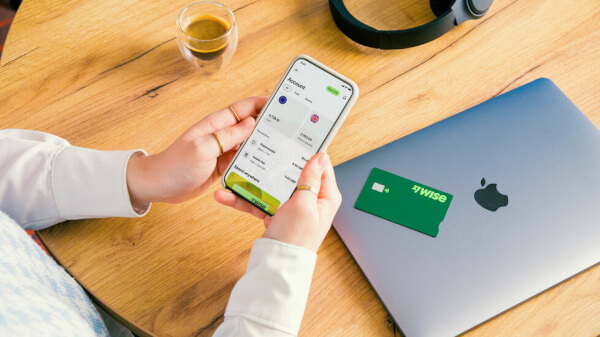5 Ways to Stand Out and Boost Black Friday Sales
Black Friday is the day after Thanksgiving, falling on Friday 29th November in 2024. It’s known for being a perfect time for snagging a bargain, opening the...

You want to import goods from China, but how do you pay Chinese suppliers?
You probably have heard terms like wire transfers, and letters of credit. How do they differ from just paying by credit card or PayPal, and how do you choose?
This simple guide takes you through 9 alternatives on how to pay Chinese suppliers. For each, we’ll look at how many suppliers accept these payment options, the risks of each, and the total costs involved. We'll also present you Wise Business as a smart option to send payments to Chinese suppliers.
If you're a business sending more than 100,000 GBP (or equivalent) monthly across different currencies, get in touch with the Wise Business sales team to discuss the best solutions for your needs.
Talk with Wise Business Sales Team 🚀
If you’re looking to make frequent payments to Chinese suppliers, consider using Wise Business.
International payments with Wise are often far less complex than other payment methods. You register, verify your account, pay in your local currency, enter your supplier’s bank information, and then your supplier gets paid in US dollars or Chinese yuan.
If you’re sending to Hong Kong, you can pay in Hong Kong Dollars or US dollars.
The supplier doesn’t have to sign up anywhere. For them, it’s just like receiving cash into their bank account. And it’s accepted everywhere.
If it’s a concern, both you and your supplier may be able to manage the balance of risk by combining Wise payments with escrow, local agencies or deposits.
You can even send CNY payments with Alipay to a personal account, to pay contractors, freelancers or employees based in China. Whether you’re making regular salary payments to your employees or one-off service payments to contractors, you can use Alipay to send up to 50,000 CNY per transfer.
To get your Wise Business account set up for payments to China, you’ll need to first sign up and pay a small one-time fee. When you do make those transfers, you’ll only pay a simple and transparent fee, and that’s it.
You don’t pay any hidden charges through poor exchange rates. All deals are done at the mid-market rate – the one you see in Google. That makes Wise quite different from other forms of international payments.
Not to mention, with Wise Business multi-currency account, you can hold money in a number of different currencies, and then send it to China when the time — or rates — are right. Besides that, Wise Business also offers you:
Get started with Wise Business 🚀
The Telegraphic Transfer is the most common payment method, and is widely accepted by suppliers.
There are risks on both sides. Suppliers will often insist on a deposit to lower their risk which subsequently then increases yours. The more customised or more hard-to-sell the goods are, the higher the deposits will normally be. As such, it’s best if you have a good relationship with your supplier.
Just like with cash, you’ll bear the cost of the foreign exchange transaction. That steep cost includes the published fee, probably several fixed SWIFT fees from intermediary banks, and the spread — the poorer exchange rate than you can find with a currency converter online.
So though wire transfers may be a common method of payment, they cost the buyer much more than most realise.
| Learn more about customs charges when importing from China to the UK |
|---|
Escrow protects both parties. It means that you pay before dispatch, but the funds are held by a third party. They aren’t sent to the supplier until you’ve received your goods.
Although popular within China, acceptance for international transactions is still low. However, if you’re buying through Alibaba, you might be offered payment using Alipay Escrow.
The idea of escrow is to reduce risk due to the long wait between order and receipt. There are still disputes, though, and it can be hard to get the dispute resolution team working on your behalf.
Fees are typically 5% of the transaction — initially charged to the supplier, but they’ll be passed on to you.
Escrow, like PayPal (which we’ll talk about in a bit) is convenient for low value transactions. Though you might want to skip them on larger transactions due to both the added expense and the reality that it can tie up your money for some time.
Larger suppliers and international trading companies are normally happy to accept LCs. Some, in fact, may insist on them. However, due to the complexity and additional language barriers, it’s not uncommon for small and medium-sized factories to be reluctant to accept this form of payment.
LCs reduce the supplier’s risk that the buyer doesn’t pay. As a buyer, LCs also give you some comfort that the supplier will conform to whatever terms you agree. This explains their popularity for very large transactions of over £50,000.
On the flip side, though, the fees are very high and the paperwork is quite complex. As such, it’s essential to get professional advice with your first transactions.
In essence, Letters of Credit are a quite expensive option. They are often only for very large transactions, or when suppliers make it a condition of business.
As mentioned, acceptance of escrow for international transactions is low. However, if you buy through a local Chinese office, acceptance is much higher. That’s why some importers use local sourcing agencies to buy their order, using an escrow arrangement.
The risks are much lower, as long as the communication is crystal clear. The agency is able to reject the goods and keep the escrow payment.
Clearly, this adds another layer of expense to the deal. Using an agency can be over and above the 5% fee charged for the escrow.
Essentially, sourcing agencies may be suitable for small transactions if you want to pay extra to avoid risk. The escrow costs are very expensive for larger transactions.
PayPal is becoming more popular among Chinese suppliers for small transactions, especially electronics sales. Although PayPal has focused on buyer protection, there are still some risks. Their protection policies are complex, particularly for international transactions.
If a dispute arises, it can take time to make your claim and, of course, you might not win.
Fees are charged as a percentage and there are also substantial exchange rate costs. If you’re buying small quantities or samples, PayPal can be a convenient way to pay. However, the fees increase quickly as the size of the transaction grows.
The bottom line is that PayPal may be convenient for low value transactions if it’s an option. But it will be far too expensive for serious importers.
To see just how much, check out our PayPal fee calculator.
Western Union (WU) is widely accepted for small or medium-sized transactions. It’s popular with suppliers because it’s fast, easy to use, and cheap — for them.
However, there are very real risks. You have little protection once you send your money. You shouldn’t even consider WU unless you know and trust your supplier.
Although published fees are low, you’ll end up paying more for your goods. This is because WU makes their money through exchange rate mark-ups¹. They charge you more for buying Chinese currency than their published exchange rate implies. And if you do a quick search for the currency pairs on Google, you’ll find quite a difference. But you won’t see the mark-up in their online price calculator — you’ll have to create an account and sign in to find out the rate they’ll offer.
By contrast, Wise Business has no mark-up. All deals are made at the real exchange rate - the same one you find on Google.
The reality is that WU can be convenient for small to medium transactions, but even then, risky and surprisingly costly.
Start saving today with Wise Business
A few technology suppliers accept card payments these days. The risks are low for you as the buyer, but high for the supplier. Fraudulent buyers can lead to high losses for the seller. Which makes cards an unpopular way of doing business among Chinese suppliers.
Fees are also high — and suppliers will pass them on to you wherever they can.
As a whole, card payments are not only unpopular with suppliers, but they’re also quite cost-prohibitive for many buyers.
Suppliers love cash, and Chinese suppliers are no different. Paying by cash is common in China, and cash discounts are sometimes available.
For you, however, it’s the riskiest way of paying. Much like Western Union, there’s little protection if you’re unhappy with your goods.
You still face costs, particularly the expense associated with any foreign exchange transaction. You’ll need to check what exchange rate mark-ups you’ll face in addition to the stated fee.
If you boil it down, though cash is popular in China, it’s quite risky for you. Not only that, but you’ll need to beware of hidden charges in the exchange rate.
Alibaba is one of the biggest platforms for bulk orders which is ideal for people looking for suppliers. If you’re one of them, there are several ways you could pay your Alibaba suppliers².
| Payment Method | Payment Speed |
|---|---|
| Debit or Credit card | 1-2 hours |
| Online bank transfer (direct to bank transfer) | 4-5 business days |
| Wire transfer or T/T | 1-7 business days |
All these payment methods come with extra charges which Alibaba usually shows on their payment page. If you’re being asked to pay in a different currency, consider using a multi-currency account to reduce the conversion fee.
Sources used:
Sources last checked August 25, 2023
*Please see terms of use and product availability for your region or visit Wise fees and pricing for the most up to date pricing and fee information.
This publication is provided for general information purposes and does not constitute legal, tax or other professional advice from Wise Payments Limited or its subsidiaries and its affiliates, and it is not intended as a substitute for obtaining advice from a financial advisor or any other professional.
We make no representations, warranties or guarantees, whether expressed or implied, that the content in the publication is accurate, complete or up to date.

Black Friday is the day after Thanksgiving, falling on Friday 29th November in 2024. It’s known for being a perfect time for snagging a bargain, opening the...

December kicks off the end of year shopping period, with huge uplifts in on and offline sales as people grab a bargain and get ready for the holiday season....

The term "turnover" is used often in the world of business, but its implications vary significantly depending on the context. At its core, turnover is a...

Wise is a financial technology company focused on global money transfers that offers two different types of accounts: a personal account and a business...

In today's fast-evolving digital landscape, e-commerce is quickly transforming the ways consumers shop and how businesses operate worldwide. DHL’s E-Commerce...

In an increasingly interconnected global economy, small businesses in the United Kingdom (UK) have more opportunities than ever to expand through import and...